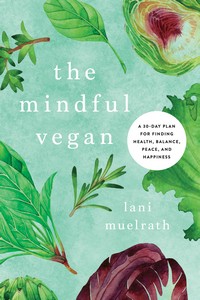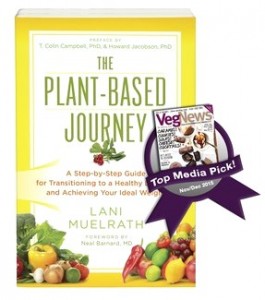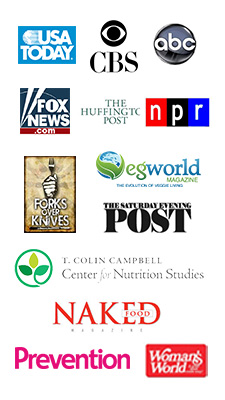Thanks to Stacy who posted a fleet of questions in a response right here on the plant-based fitness blog. They made for a great, simple article so that’s exactly where it went – to the posts!
Ive been trying to find the answer to this question, and can’t find a clear-cut answer, so maybe u can help, Lani!
What is the exact difference between McDougall, Fuhrman, and Esselstyn?
99+% on the same page. They would all agree, I am certain, that as long as you eat freely from a selection of vegetables, starchy vegetables, whole grains, legumes, and fruits, you are doing really really well. Dr. McDougall would tell you to be sure to pile on the starchies, Fuhrman would tell you to be sure to eat lots of vegetables, and Esselstyn and McDougall would both have you be very judicious about high fat foods in your diet, even such as avocados and nuts, if health is an issue. Read their books for the best match for you.
In the meantime, catch my notes from the McDougall – Fuhrman debate from last February here:
McDougall vs. Fuhrman: Notes for you from the great plant-based doctors debate
Some other questions, if u don’t mind me asking:
-how much fat (%) is recommended for the low-fat plant-based diet? How much protein (%)? Carbs (%)?
Remember, we don’t eat nutrients, we eat food. A whole – food low-fat – plant based diet without added expelled oils and concentrated, processed food and avoiding too many high fat whole foods will put you in the right place. Rather than look at isolated nutrients, look at the dietary ideal of a low fat plant-based diet of starchy vegetables, vegetables, whole grains, beans, fruit , nuts and seeds. Eating a varied diet from this selection will land you at about 10% protein, 10% fat, and 80% carbohydrate – though this varies daily and is a rough estimate depending on your choices.
-Should soy be avoided? if not, why is it allowed and what are brands of tofu that wont cause endocrine issues?
If you are sensitive to soy, avoid it. If not, in moderation it presents no problems. I don’t know about ‘brands’ when it comes to the endocrine question.
-Any tips for those who need to be gluten-free and have trouble digesting beans/legumes?
Make beans more digestible by:
1. soaking a day or two before cooking, then cooking half way and pouring off the cooking water, then cooking the rest of the way. Be sure they are cooked enough.
2. canned beans can sometime be more easily tolerated.
3. if just getting started in the bean department, start with smaller quantities, not too much at one time, chew well and work your way up. Having beans in soup can also be helpful to digestion – just be sure they’re cooked.
As for gluten-free, watch for my upcoming Teleclass with Julieanna Hever, R.D., author of Complete Idiot’s Guide to Gluten-free Vegan Cooking.
-Nutritional yeast: healthy or not ideal and why? If u use this, how do u use it?
I use nutritional yeast as a flavor agent.
-Food combining rules: fact or hoax…why?
Go on personal experience, if a certain combo doesn’t work for you then work around it. I’ve seen no research-supported reports that suggests food combining as a science.
-Have u tried Food for Life Brown Rice tortillas? Are these healthy?
Haven’t tried them. If they don’t have added fats or other items that might present problems, you should be good to go but I’m only going on the name you’ve given me. Food for Life does make some great breads and other items.
Thanks SO much and I love ur blog!!! <3!!!!!!
Thank you Stacy!
Want to get the latest updates? Get them FREE by subscribing to be sent Email Updates or RSS notifications.
Thanks so much for coming by. On facebook? Please join me here: facebook.





Needless to say, since you brought up gluten and soy all in one sentence, I had to read this weeks’ bloggy post! LOVE it. Again, so simple and to the point. Thank you for explaining in short digestible steps the differences in the three ‘schools’ of food thought. Love your blogs!
I’m a big fan of short and to the point, except for those times when I want all the details! 😉 Glad you likey Grayce and thanks so much for stopping in to say hi.
lol – I have been so busy ~ since getting home from Las Vegas, hit the ground RUNNING ~ then a baby shower, yup – grannie again #3 on his way! Enjoying my sunshine, and sharing Arbonne! love. it!
awesome article as usual Lani, you never dissapoint anyone and always there to help us all, thanks so much for all the time and research you take to answer all our questions, another great article to print out for my scrap book, cheers Anna
Thanks Anna!
Thanks for making my inquiries a post! 🙂 I feel very honored to be the source for your newest blog article, haha! Im sure I’ll be able to give u lots of topics in the future, as my thirst for health info never ceases!
Some other follow-up questions:
-Can the McD plan help people with digestive issues like IBD/colitis?
-Which beans are easiest to digest? I heard that Eden Foods makes their canned beans soaked in kombu. Do these need any special prep, like soaking, rising, boiling/dumping the water, etc?
-Do u dabble in sprouting grains or beans?
-Lastly, how can a person make this diet work if sensitive to grains (gluten, oats, buckwheat) and soy (and possibly beans, since they aren’t something I eat as of late!)? Any transition tips?
Thanks!!!
Hugs!
When we took the Esselstyn seminar in Cleveland, he said to avoid soy. He said he used to be a breast surgeon, and he is suspicious of the rleationship between soy and cancer.
Also, the Food for Life Brown Rice tortillas that they sell in the grocery stores here have added oil, sadly. There is a bakery in Florida called Sammi’s that has no oil added millet and brown rice tortillas, bagels and bread. It is very good – but expensive to ship. This is the only no oil added gluten free bread/tortilla I’ve found. 🙁
can u post the website?
The FFL tortillas only have 2.5g fat…that’s nothing at all! I dont see how that little fat can pose an issue. 2 bananas have 2g fat!
I checked Sami’s website….the yelp reviews are horrible, for they are NOT truly GF and many people have had severe gluten reactions to their products. Also, their shipping is not reliable. Oh well 🙁
Thanks Stacey for the update! Sorry you didn’t hear good news about the rice tortillas
We use the Eden Organic beans, and have used them directly from the can and have rinsed them. Either way, they’re great!
My wife and I both developed an allergy to oats after going plant strong – even the gluten-free ones. We can tolerate buckwheat, however. We have been gluten intolerant for a long time. For flour we use a mix of millet & garbanzo bean flour with cornmeal and buckwheat flour. This works well in cookies, cakes, and pancakes.
PS. Dr Esselstyn does not approve of pasta, bread, or any baked good made with flour if you need to lose weight. So the cookies, cakes & pancakes I mentioned are not approved on his plan.
TD – thanks for all the updates!
Thanks! So what do u think are proper macronutrient ratios for optimal health and muscle gain?
What is your opinion on gluten?
I’m currently doing a fruit-based diet, but it’s not working too well for me. I’m really struggling, and IDK how to change things for the better. I need to gain wt, but I’m also dealing with bad GI issues (UC, GERD, gastroparesis, over-acidity, dysbiosis) and some autoimmune issues (FMS, CFS). So, being vegan has definitely helped (I was on the dreaded ANti-candida/SCD/GAPS/Paleo type diets), but I need to balance things out better and could really use guidance. My protein is really low and I cant get my cals up and I have to base my diet on bananas and dates, which tend to make me bloated/gassy/distended…and even then, it’s hard for me to get my cals above 1200. I need to gain approx 25 pounds, which is a lot for someone who is 5’1. I also seem to react to a lot of foods, so eating is always an experiment, which makes meal times not too fun! Any advice?
I’m SO confused about nutrition now…everything and everyone contradicts everything else and I feel like Ive tried nearly everything… It’s really depressing and discouraging. I know the body has the ability to heal naturally under the right conditions, but mine seems impervious! I just want to gain my muscle/strength back and eat a diet that is healthy, balanced, healing, and enjoyable!
I used to be a weight lifter/swimming/runner, but those days are long gone due to my current state. 🙁 I want to look/feel/be as vibrant as u, Lani! 🙂
Susie,
An all-fruit diet, or one that is primarily fruit, is not going to give you the protein or cals you need, no doubt. I know I am always hungry if I’ve only had fruit for breakfast – so I don’t do that any more!
I posted my 5 food groups for you on another thread, here it is again for your convenience: https://lanimuelrath.com/weight-loss/the-5-food-groups-my-simple-plan-for-a-whole-foods-low-fat-plant-based-diet/. This should help give ideas about more balance and calories.
As for conflicting information, I know what you mean. What I do is look for that which has the most longevity of support by documented, peer-approved literature, not just something that worked on a few people to lose weight in a couple of weeks – or years. And you know that the Ornish program has been approved by Medicare? That’s HUGE and a testament to its longevity of practice!
Just recently diagnosed with heart disease and I’m only 50! Significant involvement of my main artery and the others are clear. I am brand new to following Ellelstyn lifestyle and confused about
1. whether or not I should go gluten free ?
2. whether or not sesame seeds are okay to eat? My cardiologist said stay away from the sesame seeds and the gluten
3. And what about sugar? How much is that allowed? I don’t add sugar but I’m sure there’s plenty of it in the fruits that I eat . I am 100% in shape and no diabetes or high blood pressure or any other medical conditions for that matter